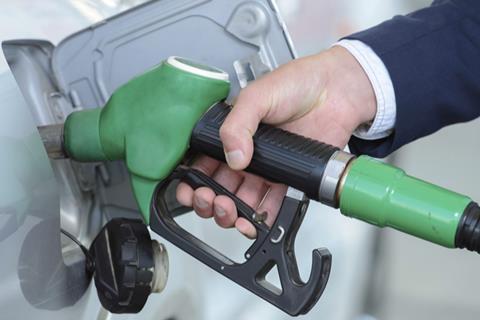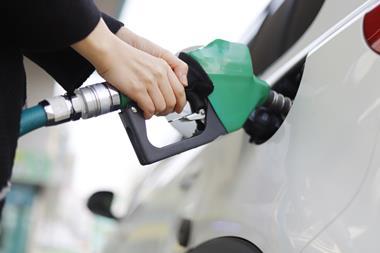
A review of the road fuel market has cleared retailers of profiteering but ordered an in-depth investigation after it found “cause for concern in the growing gap between the price of crude oil when it enters refineries, and the wholesale price when it leaves refineries as petrol or diesel”.
It reported that the 5p cut in fuel duty in March was passed on by retailers, that their average margins remained stable over the past year, and that the retail market appears to be competitive.
An urgent review of the road fuel market was requested by business secretary Kwasi Kwarteng last month after a surge in prices, and the Competition and Markets Authority (CMA) today reported that:
- the main drivers of increased road fuel prices are the rising cost of crude oil, and a growing gap between the crude oil price and the wholesale price of petrol and diesel – the so-called ‘refining spread’;
- the ‘refining spread’ tripled in the past year, increasing from 10p to nearly 35p per litre;
- over the same period, the so-called ‘retailer spread’ (the difference between the wholesale price and the price charged to motorists) fluctuated but remained about 10p per litre on average;
- on the whole the fuel duty cut appears to have been implemented, with the largest fuel retailers doing so immediately and others more gradually; and
- there are significant differences in price between many rural and urban areas.
The CMA said that in light of the concerns found and the urgency of the situation, it has today launched a market study that will examine the road fuel market in more depth. An interim update will be published in the autumn.
Market studies allow the CMA to use compulsory information-gathering powers to probe entire markets and can result in recommendations to government or a full market investigation reference.
The CMA was also asked by the UK government to advise on possible measures “to increase the transparency that consumers have over retail prices”. The review sets out how an open data scheme could help consumers more easily access and compare local pump price information, and create new commercial opportunities for tech developers. It added that there may also be merit in providing more information about pump prices on motorways.
The CMA report found that the dollar-terms increase in oil prices over the past year accounts for around a third of the rise in road fuel prices (20p per litre), with the fall in the value of sterling in that period adding a further 12% (7p per litre). It said the growing gap between the price of crude oil entering refineries and the wholesale price of petrol and diesel leaving them accounts for just over 40% of the growth in road fuel prices (24p per litre). Both increased demand post-Covid-19 recovery and reductions in supply (in particular due to the Russian invasion of Ukraine and the mothballing of refining capacity during Covid-19) appear to have played a role in driving up the refining spread.
It added: “Although there are concerns from some about fuel retailers profiting from the current situation, our review finds that over the course of a year, the gap between wholesale prices and retail prices (the ‘retailer spread’) has not been a significant contributor to the overall rise in pump prices.
“The retailer spread is volatile, and the CMA is aware that in recent weeks it has grown larger. The CMA will be monitoring this closely as it takes forward the market study.
“Further analysis of the relationship between wholesale and retail prices – including how rises and falls in wholesale prices are reflected at the pump – will be carried out as part of the CMA’s market study.”
Sarah Cardell, CMA general Ccounsel, said: “The recent rises in pump prices are a major worry for millions of drivers. While there is no escaping the global pressures pushing up fuel prices, the growing gap between the oil price, and the wholesale price of petrol and diesel, is a cause for concern. We now need to get to the bottom of whether there are legitimate reasons for this and, if not, what action can be taken to address it.
“On the whole the retail market does seem to be competitive, but there are some areas that warrant further investigation. These include finding out whether the disparities in price between urban and rural areas are justified.
“This area of work is a major priority for the CMA and if we can help, we will. That’s why we are immediately launching a market study that will use our formal legal powers to investigate this in more depth. If evidence emerges of collusion or similar wrongdoing, we won’t hesitate to take action.”
The PRA said it was reassured by the findings of the review, which reiterated that there is no evidence that retailers have profited from failing to pass on the fuel duty cut.
Gordon Balmer, executive director of the PRA, said: “We agree with the findings of the CMA’s investigation. In recent months, we have seen motoring organisations and politicians attempting to scapegoat petrol retailers. This report exonerates petrol retailers and leaves unanswered questions about the extent to which these critics understand the retail fuel market at all.
“The PRA will continue to invite politicians, campaign groups and motoring organisations to educate themselves better about the market. We hope the CMA’s market investigation will lead to a more grown-up debate about how to achieve the best prices for drivers.
“We are confident that this report will reassure motorists that petrol retailers are doing their best to keep their communities fuelled and fed, while operating on tight margins.”
ACS chief executive James Lowman said: “We welcome this urgent review into the fuel market which recognises the factors affecting the price of fuel that are outside of retailers’ control. We are pleased that the CMA have acknowledged that retailers did pass on the duty rate cuts to drivers even when wholesale prices were rising. We will continue to engage with the CMA in their formal market study into the fuel market.”
A spokesperson for the oil industry body UKPIA said: “UKPIA notes the findings of the Competition and Markets Authority (CMA) review into the road fuel market. The initial review was undertaken at speed and CMA had already indicated a full investigation might follow in its initial response to the secretary of state, so we will continue to work constructively with the CMA and government to fully understand the issues which have been identified.
“At a time when the cost of living is rising, UKPIA understands that recent price increases at the pumps will be a concern for motorists, families and businesses across the UK.
“As the findings of the review show, the UK typically benefits from a competitive domestic supply chain and prices tend to be most affected by changes in crude oil prices and other supply and demand factors, which have been particularly volatile in 2022.
“Tax is also a significant cost, which account for a large proportion of the pump price. We would note that when fuel duty and tax is excluded, UK petrol and diesel prices have been consistently among the lowest in Western Europe.”
RAC fuel spokesman Simon Williams said: “We welcome the CMA’s report and the commitment to a fuller market review. We are particularly pleased to see that the CMA acknowledges the gap between wholesale and retail prices has been widening in recent weeks. Regardless of the reasons for wholesale prices being what they are we continue to believe there is clear evidence, not least in the last week, that major retailers are incredibly slow to pass on falling wholesale costs, yet quick to pass on rising ones. The idea of allowing drivers to more easily compare pump prices near them may also prove beneficial.
“The question drivers may have, however, is how long the review will take and – crucially – when they might see a change to what they pay every time they fill up. As each day goes by and the cost-of-living crisis is felt ever more keenly, the need for retailers – especially the largest ones – to reflect wholesale prices fairly becomes ever more urgent. We urge the Government to ensure it’s in a position to scrutinise the relationship between wholesale and retail prices. And where issues are found, it must be able to take action that quickly leads to fairer prices.”

































No comments yet